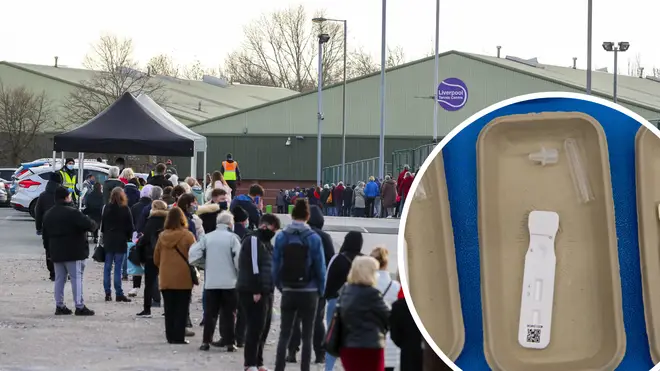
Clive Bull 1am - 4am
7 July 2021, 09:38

Covid cases fell by around a fifth in Liverpool during a mass testing pilot that may have prevented thousands of new Covid infections, the results of the trial suggest.
The pilot from November to April saw 57 percent of the city - 283,338 people - volunteer to take a lateral flow test even though they had no symptoms.
Around 6,300 asymptomatic Covid cases were discovered during the period, with researchers estimating there was an 18 percent increase in case detection and 21 percent reduction in cases compared to other areas.
Scientists said while a pessimistic model suggests 850 infections were prevented, optimistic modelling suggests 6,600 were prevented.
But the trial also found that lateral flow tests had an overall sensitivity of only 40 percent, compared to cases found by PCR tests.
Read more: Chris Whitty warns young people face 'significant amount more long Covid' this summer
Read more: Schoolchildren missed out on a third of learning during coronavirus pandemic

Can a fruit drink fool a lateral flow test?
Despite this, Professor Calum Semple, professor of outbreak medicine at the University of Liverpool and member of the Scientific Advisory Group for Emergencies, said the benefit of rapid testing is clear.
"We were seeing the benefit of rapid testing in the community on a wide scale and we can see it drove down cases, so arguing the pros and cons of PCR and its sensitivity - you could argue its over-sensitivity - was not what this was about.
"This was about testing one device across our community and seeing how it could get our community back on its feet."
Professor Iain Buchan, chair of public health and clinical informatics at the faculty of health and life sciences at the University of Liverpool, said the lateral flow devices had "performed as expected from biology".
"Identifying people with bigger loads of virus, [who are] more likely to be infectious - and doing so in less than an hour... enabled isolation a day sooner than was possible with PCR tests," he continued.
Read more: Lifting restrictions will make public take Covid threat less seriously, study suggests
Read more: Fully-vaccinated holidaymakers could avoid quarantine after July 19 'Freedom Day'

LBC speaks to first people in the queue for mass testing in Liverpool
By 3 March this year, 3,263 days of isolation were also saved through a test-to-release pilot run for emergency services and prison staff in Liverpool.
Liverpool's director of public health, Matthew Ashton, said the use of lateral flow tests gives the "opportunity to close down outbreaks at a much earlier stage by that large-scale hyperlocal deployment of LFT".
He added: "We hope our learning can be used by Governments here and abroad, not just in managing Covid-19 but also in future pandemics."